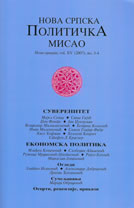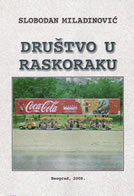|
When the Great War comes, said old Bismarck, it will come out of "some damn fool thing in the Balkans."
On June 28, 1914, Gavrilo Princip shot the archduke and heir to the Austrian throne Franz Ferdinand in Sarajevo , setting in motion the train of events that led to the First World War.
In the spring of 1999, the United States bombed Serbia for 78 days to force its army out of that nation's cradle province of Kosovo . The Serbs were fighting Albanian separatists of the Kosovo Liberation Army (KLA). And we had no more right to bomb Belgrade than the Royal Navy would have had to bombard New York in our Civil War.
We bombed Serbia , we were told, to stop the genocide in Kosovo. But there was no genocide. This was propaganda. The United Nations' final casualty count of Serbs and Albanians in Slobodan Milosevic's war did not add up to 1 percent of the dead in Mr. Lincoln's war.
Albanians did flee in the tens of thousands during the war. But since that war's end, the Serbs of Kosovo have seen their churches and monasteries smashed and vandalized and have been ethnically cleansed in the scores of thousands from their ancestral province. In the exodus they have lost everything. The remaining Serb population of 120,000 is largely confined to enclaves guarded by NATO troops.
"At a Serb monastery in Pec," writes the Washington Post, "Italian troops protect the holy site, which is surrounded by a massive new wall to shield elderly nuns from stone-throwing and other abuse by passing ethnic Albanians."
On Sunday, Kosovo declared independence and was recognized by the European Union and President Bush. But this is not the end of the story. It is only the preface to a new history of the Balkans, a region that has known too much history.
By intervening in a civil war to aid the secession of an ancient province, to create a new nation that has never before existed and to erect it along ethnic, religious, and tribal lines, we have established a dangerous precedent. Muslim and Albanian extremists are already talking of a Greater Albania, consisting of Albania, Kosovo, and the Albanian-Muslim sectors of Serbia, Montenegro, and Macedonia.
If these Albanian minorities should demand the right to secede and join their kinsmen in Kosovo, on what grounds would we oppose them? The inviolability of borders? What if the Serb majority in the Mitrovica region of northern Kosovo, who reject Albanian rule, secede and call on their kinsmen in Serbia to protect them?
Would we go to war against Serbia , once again, to maintain the territorial integrity of Kosovo, after we played the lead role in destroying the territorial integrity of Serbia ?
Inside the U.S.-sponsored Federation of Bosnia and Herzegovina, the autonomous Serb Republic of Srpska is already talking secession and unification with Serbia . On what grounds would we deny them?
The U.S. war on Serbia was unconstitutional, unjust, and unwise. Congress never authorized it. Serbia , an ally in two world wars, had never attacked us. We made an enemy of the Serbs, and alienated Russia , to create a second Muslim state in the Balkans.
By intervening in a civil war where no vital interest was at risk, the United States , which is being denounced as loudly in Belgrade today as we are being cheered in Pristina, has acquired another dependency. And our new allies, the KLA, have been credibly charged with human trafficking, drug dealing, atrocities, and terrorism. And the clamor for ethnic self-rule has only begun to be heard.
Romania has refused to recognize the new Republic of Kosovo, for the best of
reasons. Bucharest rules a large Hungarian minority in Transylvania, acquired at the same Paris Peace Conference of 1919 where Croatia, Slovenia, and Bosnia-Herzegovina were detached from Vienna and united with Serbia.
Abkhazia and South Ossetia, two provinces that have broken away from Georgia , are invoking the Kosovo precedent to demand recognition as independent nations. As our NATO expansionists are anxious to bring Georgia
into NATO, here is yet another occasion for a potential Washington-Moscow clash. Spain , too, opposed the severing of Kosovo from Serbia, as Madrid faces similar demands from Basque and Catalan separatists.
The Muslim world will enthusiastically endorse the creation of a new Muslim state in Europe at the expense of Orthodox Christian Serbs. But Turkey is also likely to re-raise the issue as to why the EU and United States do not formally recognize the Turkish Republic of Northern Cyprus . Like Kosovo, it, too, is an ethnically homogeneous community that declared independence 25 years ago.
Breakaway Transnistria is seeking independence from Moldova , the nation wedged between Romania and Ukraine , and President Putin of Russia has threatened to recognize it, Abkhazia, and South Ossetia in retaliation for the West's recognition of Kosovo.
If Putin pauses, it will be because he recognizes that of all the nations of Europe, Russia is high among those most threatened by the serial Balkanization we may have just reignited in the Balkans.
COPYRIGHT CREATORS SYNDICATE, INC. |




.jpg)





















